Lab Man Mano (慢慢弄乳酪坊) is a temple to traditional Italian cheese-making located in the heart of old Taipei. Down a side street in Dadaocheng, its unassuming location belies a dream of Old World taste, charm and hospitality that founder Isabella Chen (陳淑惠) spun out of thin air — and milk — two years ago.
The best time to visit is on a Friday afternoon. If you plan your visit right, Chen will be there behind a glass panel, coaxing mounds of soft, fresh cheese into fishball-like rounds of bocconcini, bars to be shredded for stracciatella and balls of mozzarella so luminescent they resemble light bulbs. Her hands are a blur as they twist mozzarella into knots called nodini — a mark of handmade cheese, since machines cannot produce the shape.
“People say that if you are happy, then the food you make will taste good,” Chen says during a rare break in her day.
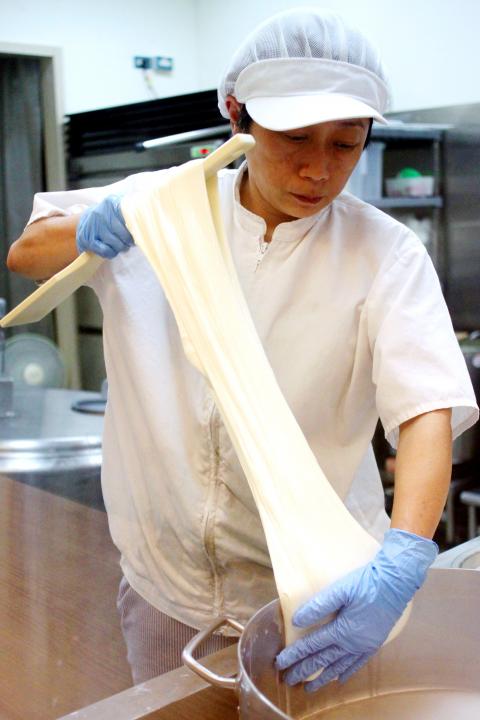
Photo: Davina Tham, Taipei Times
Chen became a professional cheese-maker at the age of 40, leaving behind a long career in the media industry. Fluent in Italian, she had already been making cheese at home as a hobbyist, learning from books and Italian artisans on online fora.
When she made up her mind to turn professional, Chen sought out intensive apprenticeships to learn exactly what it would take to run a commercial cheese-making operation. She apprenticed for three months at Cheese Stand in Tokyo and one month at Sapori delle Masserie in Putignano, a town in southern Italy, before opening her own shop.
Two years on, Chen holds resolutely to the conviction that motivated her when she first started Lab Man Mano — that cheese made in Taiwan can be as good as that made in Italy.
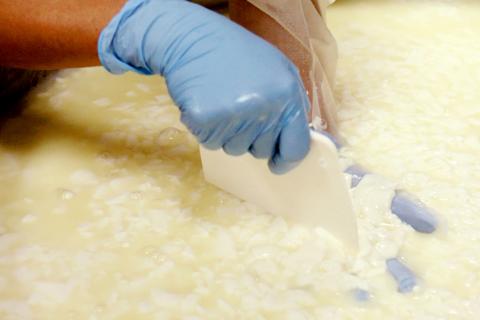
Photo: Davina Tham, Taipei Times
“As long as I do my part well, and I use good milk, we will definitely not lose to cheese made overseas,” Chen said.
A DAY IN A CHEESE ARTISAN’S LIFE
The number of professional cheese-makers in Taiwan can be counted on one hand. Before Lab Man Mano, failed ventures led to the thinking that artisanal cheese-making could not be done here, and even if it could, there was no market for it.
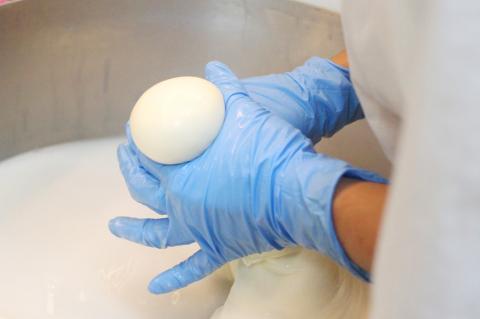
Photo: Davina Tham, Taipei Times
It’s a peculiarity of Taiwan that people do not take seriously the skills required to make cheese, “perhaps because we do not yet think of cheese-making as a profession,” Chen says.
Many a young hopeful has found the work too difficult and disappeared after just a few days on the job. Even professional chefs expect to be able to make cheese for paying customers after just one lesson at Lab Man Mano.
“It’s not just physical labor, but emotional and mental labor. You have to use your brain,” Chen says.
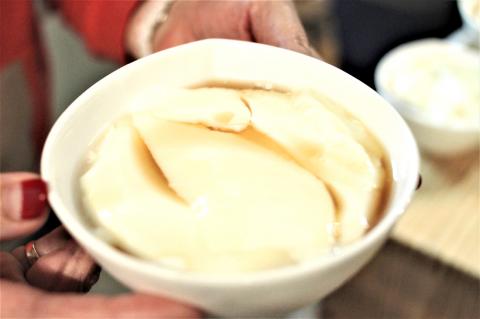
Photo: Davina Tham, Taipei Times
Twice a week, Chen and two of her apprentices make cheese. At six in the morning, the delivery from her milk supplier in Taoyuan arrives. There are no dairy buffalo farms in Taiwan, so the milk comes from cows. Dairy farmers are an insular community, and it took Chen months of cultivation to gain the trust of a farmer whose milk was up to her standards.
In the kitchen, raw milk is pasteurized and lactobacillus and rennet added to start the curdling process. When curds have formed, Chen methodically drags a large whisk-like tool called a spino through the curds to cut them up and encourage whey to drain. When enough whey has separated, several liters go into waist-high vats to be cooked into ricotta.
As the most junior apprentice in professional cheese-making kitchens, Chen was tasked with cooking the ricotta, which makes for backbreaking work because of high stove temperatures and the need for constant stirring.
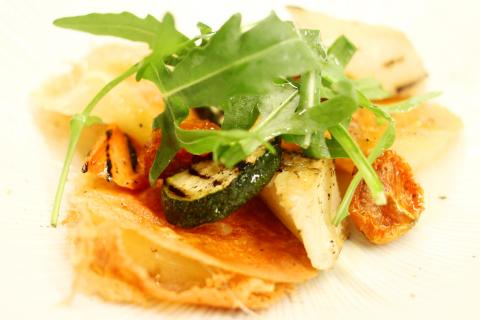
Photo: Davina Tham, Taipei Times
At Lab Man Mano, Chen persists in doing this the Italian way, with no added cream and only a touch of milk, resulting in a ricotta with lower fat content and less creamy mouthfeel than imported supermarket varieties.
The morning’s work is a test of patience, but the rhythm picks up in the afternoon. Lab Man Mano specializes in a type of cheese called pasta filata or stretched-curd cheese. Chen performs the filatura, an action of pulling and stretching the curds into a smooth ball of cheese in hot, salted water. This is the essence of pasta filata, and in Italy, only the most senior cheese-makers would be entrusted with the task.
After a day of observing her in the kitchen, it is understandable why romantic notions of artisanal cheese-making frustrate Chen. The profession consists of repetitive work days lasting upwards of 10 hours, demanding discipline and a detail-oriented nature.
HOW TAIWAN EATS CHEESE
“I tend to hope that what we have here is not just an ordinary restaurant or mozzarella bar, but a hub for spreading Italian cheese,” Chen says. Part of that hub’s work is to find out what the cheese becomes when it encounters Taiwanese culinary traditions and sensibilities.
String cheese marinated in soy sauce has become a store fixture, a gateway cheese for the Taiwanese novitiate. But Chen particularly enjoys when compatriots like Alex Peng (彭天恩), head chef of the acclaimed Akame in Pingtung, push her into unexplored territory. Peng has asked her to make cheeses infused with Aboriginal ingredients such as millet wine and mountain pepper, or maqaw (馬告).
“What I know is how Italians eat cheese, but our chefs have many of their own ideas, and that to me is more interesting because it brings out different flavors,” Chen says. One chef scorched her mozzarella with a blowtorch, and the resultant char was reminiscent of seared sushi.
Lab Man Mano itself serves traditional Italian food. A large wooden table that seats 10 evokes a dining room in one’s own home, and regulars are partial to booking out the restaurant for raucous gatherings.
The subtle milky fragrance of fresh cheese comes through in a mozzarella sheet rolled around arugula, tomatoes and pancetta (NT$250), which despite being dubbed “sushi” in the menu is a traditional way of eating mozzarella in southern Italy. But for those who are used to eating cheese raw with only a few accents, what stands out is the chef’s seamless integration of cheese into cooked dishes.
Caciocavalla, a gourd-shaped cheese that Chen ages for three weeks, is sliced, pan-seared and served with grilled vegetables in a warm salad (NT$300). The gooey caciocavallo with crisp and lacy edges distills all the best parts of a grilled cheese sandwich.
From the seasonal menu of main dishes, a well-seasoned pork hamburger steak (NT$350) arrives, the lean meat playing off against a molten mozzarella core and the sharp kick of Gorgonzola cheese sauce.
While the cheese platter (NT$350) suffices for a dessert option in most Italian restaurants, Lab Man Mano understands that expectations of a mozzarella bar are higher, and it delivers.
Fresh burrata served with honey and seasonal fruit (NT$300) may not be a common presentation of cheese in Italy, but Chen’s instinct that they are natural complements is to be trusted. Another intriguing offering is an affogatto with smoked ricotta gelato (NT$180).
There is a small commotion around the table when the hostess brings out a pot of warm, fresh curds, which are ladled into bowls and topped with tea-infused syrup (NT$60). Chen first made this traditional dessert at the request of a friend, who had tried it at a family farmstead in the French countryside. The fresh curds are so delicate they fall apart at the suggestion of a tongue, filling the mouth with a milky perfume.
One cheese that Chen hopes to add to Lab Man Mano’s repertoire some day is tomino, an Italian bloomy-rind variety similar to the French Brie or Camembert. Making tomino would require a separate controlled environment for aging. But before any expansion, which would probably involve a relocation nearer to the dairy farm, Chen wants to raise orders and optimize production at her current location.
Man mano means “gradually” or “little by little” in Italian, and its homonym in Mandarin means to “do things slowly.” Lab Man Mano shares its snail logo with the slow food movement founded in Italy in the 1980s. Three mozzarella-shaped humps on the snail’s back symbolize the principles of the movement: good, clean and fair.
This ethos suffuses Chen’s approach to her craft. The quality of her cheese, made in a hygienic environment with a sense of justice toward her suppliers, teachers, apprentices, Taiwanese environment and Italian traditions, speaks for itself.
“I think that when something is delicious, then people will seek to understand it. If I let them try the cheese and they feel that it tastes good, it’s worth more than if I were to stand there saying a hundred things to them.”
■ Lab Man Mano is located at 16, Lane 272, Yanping N Rd Sec 2, Taipei City (台北市延平北路二段272巷16號). The restaurant is open Wednesday to Saturday from noon to 9pm and every Sunday from noon to 5pm. Lunch service is from noon to 2:30pm and dinner service is from 5:30pm to 7:30pm. Customers can watch cheese being made on Friday afternoons. Reservations are encouraged.
■ For more information and to order cheese online, visit: www.labmanmano.com.

Most heroes are remembered for the battles they fought. Taiwan’s Black Bat Squadron is remembered for flying into Chinese airspace 838 times between 1953 and 1967, and for the 148 men whose sacrifice bought the intelligence that kept Taiwan secure. Two-thirds of the squadron died carrying out missions most people wouldn’t learn about for another 40 years. The squadron lost 15 aircraft and 148 crew members over those 14 years, making it the deadliest unit in Taiwan’s military history by casualty rate. They flew at night, often at low altitudes, straight into some of the most heavily defended airspace in Asia.

Beijing’s ironic, abusive tantrums aimed at Japan since Japanese Prime Minister Sanae Takaichi publicly stated that a Taiwan contingency would be an existential crisis for Japan, have revealed for all the world to see that the People’s Republic of China (PRC) lusts after Okinawa. We all owe Takaichi a debt of thanks for getting the PRC to make that public. The PRC and its netizens, taking their cue from the Chinese Communist Party (CCP), are presenting Okinawa by mirroring the claims about Taiwan. Official PRC propaganda organs began to wax lyrical about Okinawa’s “unsettled status” beginning last month. A Global

Taiwan’s democracy is at risk. Be very alarmed. This is not a drill. The current constitutional crisis progressed slowly, then suddenly. Political tensions, partisan hostility and emotions are all running high right when cool heads and calm negotiation are most needed. Oxford defines brinkmanship as: “The art or practice of pursuing a dangerous policy to the limits of safety before stopping, especially in politics.” It says the term comes from a quote from a 1956 Cold War interview with then-American Secretary of State John Foster Dulles, when he said: ‘The ability to get to the verge without getting into the war is

Like much in the world today, theater has experienced major disruptions over the six years since COVID-19. The pandemic, the war in Ukraine and social media have created a new normal of geopolitical and information uncertainty, and the performing arts are not immune to these effects. “Ten years ago people wanted to come to the theater to engage with important issues, but now the Internet allows them to engage with those issues powerfully and immediately,” said Faith Tan, programming director of the Esplanade in Singapore, speaking last week in Japan. “One reaction to unpredictability has been a renewed emphasis on